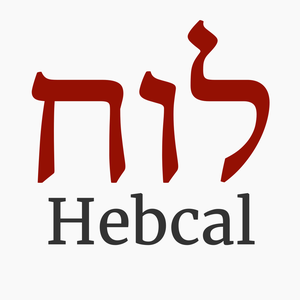Your comments
Sorry to hear you are having difficulty with this! Sounds frustrating and we hope we can help.
Can you share the exact download.hebcal.com URL with us so we can inspect the server side?
Are you following these Outlook.com Jewish holidays download instructions? or are you using the more generic iCalendar/ICS Jewish holidays download instructions?
Thanks for your message.
We have confirmed that our Jewish Holidays (only major holidays) feed contains only major holidays such as Rosh Hashana, Yom Kippur, Passover, Hanukkah. That feed does NOT include minor & modern holidays, fast days or Rosh Chodesh.
We offer a separate Jewish Holidays (all holidays) feed which contains major, minor, modern Israeli holidays, fast days and more.
You can subscribe any of these specialized feeds at https://www.hebcal.com/ical/
We note that you mention "Gedaliah Fast" and not "Tzom Gedaliah". Some non-Hebcal holiday feed providers (for example Google Calendar itself) use the event title "Gedaliah Fast". If you're seeing that event title and not "Tzom Gedaliah" then it suggests that you didn't subscribe via Hebcal.com. For the fast of Gedaliah, only use the title "Tzom Gedaliah"
Thanks for the suggestion. We appreciate this input and will consult some other sources to see if this proposal aligns with other calendars.
Shana Tova!
Thank you for the bug report. We have fixed the issue with Hebrew not rendering correctly on the Hebcal website.
We're terribly sorry for the inconvenience
Thanks for using Hebcal! We're sorry to hear you're having difficulty downloading and importing the correct year for your calendar.
Calendars created by Hebcal are easily downloaded and imported into various calendar apps, including iPhone, Google Calendar, Outlook PC, Outlook Web, macOS Calendar, and any app that supports iCalendar (.ics) feeds or subscriptions.
Please follow those links above to find specific instructions for your calendar program. After you've done so, feel free to contact us with any additional questions.
Shana Tova!
A perpetual calendar subscription shows only the current year + future years.
Because of the feed limit requirements, perpetual calendar subscription feeds do not contain past year events. Doing so would further reduce the number of future years included in the feed.
There is no way to subscribe to (not download) to previous years. You may download previous year events.
If you’d like to download future or past events to Google Calendar or another program that supports iCalendar (.ics) files such as macOS Calendar or Outlook, you may utilize Hebcal’s alternative download instructions below. This technique requires a laptop/desktop computer and generally does not work well on a smartphone or tablet. Note that once downloaded, these .ics files are no longer managed by Hebcal and will not refresh.
Please note that these instructions are recommended only for advanced users. If you don’t take great care to create a separate calendar and import Hebcal events into that new, separate calendar, you may unintentionally add hundreds of events to your personal calendar.
https://www.hebcal.com/home/59/google-calendar-alternative-instructions
The size limitation is imposed by Google Calendar and other 3rd party calendar apps. We cannot change it because we are not Google. This is described in detail on the page
https://www.hebcal.com/home/1398/number-of-years-in-calendar-feed-subscriptions
This page also suggests a recommended workaround: multiple subscriptions
Note that if you’d like to include the Hebrew date for every day of the year, you can subscribe to that calendar via a separate calendar feed at our Jewish Holiday downloads page. Look for Hebrew calendar dates (English) or Hebrew calendar dates (Hebrew).
Daf Yomi and other daily learning single-purpose iCalendar feeds are also available on that page for Apple, Google, and any iCalendar application.
An added advantage of the multi-subscription approach is that you can choose separate colors in Google Calendar or iOS/iCloud calendar for each calendar event feed.
again, please read the article we suggested before if you have further questions.
https://www.hebcal.com/home/1398/number-of-years-in-calendar-feed-subscriptions
That sounds like a good strategy!
We document the exact list of exception cities on this page and don't intend to change them very frequently, but you're right that making your own list is more durable and insulates you from any future changes.
https://www.hebcal.com/home/4463/candle-lighting-havdalah-fast-times
Hebcal defaults to 18 minutes before sundown for most all locations. The only exceptions are 40 minutes before sundown for Jerusalem, 30 minutes for Haifa and Zikhron Yaakov.
So if you don’t specify b, it will be 18 unless it’s one of those 3 cities.
Note also b=on may be harmless now but isn’t recommended according to the documentation. If that parameter is specified it should be a positive integer only.
Customer support service by UserEcho


Thanks for pasting the URL - this helps us understand the calendar settings you're using.
Your calendar subscription is a 2-year perpetual calendar feed with events for the current year (5785) plus 1 future year. We've confirmed that the feed contains events starting October 2024 (Rosh Hashana 5785) and ends in September 2026 (Erev Rosh Hashana 5787).
However, we subscribed to this exact calendar feed on Outlook Web and we see exactly the issue you are describing. For some reason Outlook is not fetching all of the events in the feed.
We're going to keep investigating, but in the interim we have a recommended workaround: unsubscribe from this calendar feed and use multiple Hebcal.com calendar subscriptions.
For example, if you’d like to include the Hebrew date for every day of the year, you can subscribe to that calendar via a separate calendar feed at our Jewish Holiday downloads page. Look for Hebrew calendar dates (English) or Hebrew calendar dates (Hebrew).
We have an article that explains why calendar apps like Outlook.com impose size limits on individual calendar feeds, and how multiple calendar feeds avoids this problem
https://www.hebcal.com/home/1398/number-of-years-in-calendar-feed-subscriptions
An added advantage of the multi-subscription approach is that you can choose separate colors in Google Calendar or iOS/iCloud calendar for each calendar event feed.